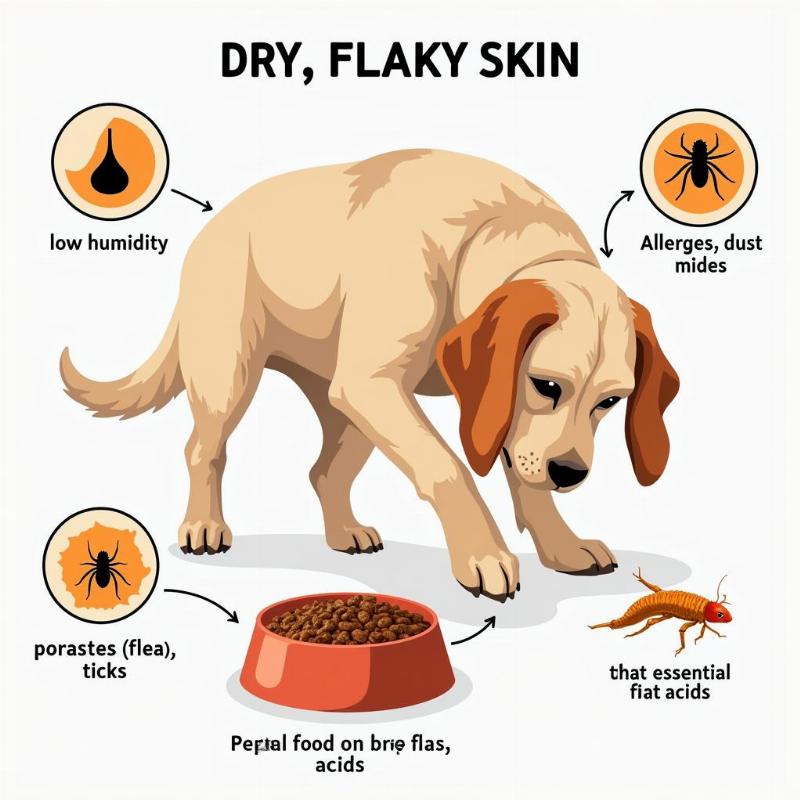Dry, flaky skin can make your furry friend uncomfortable and itchy. Understanding the best thing for dry skin for dogs involves more than just a quick fix; it requires addressing the underlying cause and providing consistent care. In this comprehensive guide, we’ll explore the causes of canine dry skin, effective remedies, and preventative measures to keep your dog’s coat healthy and vibrant.
Identifying the Causes of Dry Skin in Dogs
Several factors can contribute to dry skin in dogs. From environmental factors like low humidity and excessive bathing to underlying health issues like allergies and parasites, pinpointing the cause is crucial for effective treatment. Dietary deficiencies, especially a lack of essential fatty acids, can also play a significant role.
Common Culprits Behind Canine Dry Skin
- Environmental Factors: Dry climates, low humidity, and excessive exposure to sun and wind can strip your dog’s skin of its natural moisture. Over-bathing with harsh shampoos can also disrupt the skin’s protective barrier.
- Allergies: Just like humans, dogs can suffer from allergies to environmental allergens like pollen, dust mites, and mold, as well as food allergies. These allergies can manifest as itchy, dry skin.
- Parasites: Fleas, ticks, and mites can cause intense itching and irritation, leading to dry, flaky skin.
- Nutritional Deficiencies: A diet lacking essential fatty acids, particularly omega-3 and omega-6, can contribute to dry skin and a dull coat.
- Underlying Health Conditions: Certain medical conditions, such as hypothyroidism and Cushing’s disease, can also cause dry skin.
 Causes of Dry Skin in Dogs
Causes of Dry Skin in Dogs
Effective Remedies for Dry Skin
Once you’ve identified the potential cause of your dog’s dry skin, you can begin implementing effective remedies. These range from topical treatments to dietary adjustments.
Topical Treatments for Dry Skin
- Oatmeal Baths: Soaking your dog in a lukewarm oatmeal bath can soothe irritated skin and reduce itching.
- Medicated Shampoos and Conditioners: Veterinarian-recommended shampoos and conditioners containing ingredients like ceramides and hyaluronic acid can help restore moisture and repair the skin barrier.
- Topical Sprays and Creams: For localized dry patches, topical sprays and creams containing aloe vera, coconut oil, or other moisturizing agents can provide relief.
Dietary Changes for Healthier Skin
- Omega-3 and Omega-6 Fatty Acid Supplements: Adding these essential fatty acids to your dog’s diet can significantly improve skin health and coat shine. Fish oil and flaxseed oil are excellent sources.
- High-Quality Dog Food: Choose a dog food formulated with high-quality ingredients and a balanced blend of nutrients, including essential fatty acids.
Preventing Dry Skin in Dogs
Preventing dry skin is often easier than treating it. A few simple steps can make a big difference.
Proactive Measures for Healthy Canine Skin
- Humidifier: Using a humidifier, especially during dry winter months, can add moisture to the air and prevent your dog’s skin from drying out.
- Proper Grooming: Regular brushing helps distribute natural oils and remove dead skin cells, promoting healthy skin and a shiny coat.
- Limited Bathing: Bathe your dog only when necessary, using a gentle, hypoallergenic shampoo.
- Parasite Prevention: Regularly apply flea and tick preventatives to protect your dog from parasites that can cause skin irritation.
Conclusion
Finding the best thing for dry skin for dogs requires a holistic approach, addressing both the symptoms and underlying causes. By understanding the factors contributing to dry skin and implementing effective remedies and preventative measures, you can help your furry friend maintain healthy, hydrated skin and a vibrant coat. Remember to consult with your veterinarian for personalized advice and to rule out any underlying medical conditions.
FAQ
- How often should I bathe my dog with dry skin? Bathe your dog only when necessary, typically every 4-8 weeks, or as recommended by your veterinarian.
- Can I use human moisturizer on my dog? It’s best to avoid using human moisturizers on dogs as they may contain ingredients that are harmful if ingested.
- What are the signs of a food allergy in dogs? Common signs of food allergies include itchy skin, digestive upset, and ear infections.
- How can I tell if my dog has parasites? Signs of parasites include excessive scratching, hair loss, and visible fleas or ticks.
- What is the best type of brush for a dog with dry skin? A soft-bristled brush is ideal for dogs with dry skin as it helps distribute natural oils without causing irritation.
- Are there certain breeds of dogs more prone to dry skin? Yes, some breeds, such as Bulldogs and Shar-Peis, are more susceptible to dry skin.
- When should I take my dog to the vet for dry skin? If your dog’s dry skin is severe, persistent, or accompanied by other symptoms, consult your veterinarian.
Related Articles
Beautdogs.us is your premier resource for all things dog-related in the US. We offer expert advice on dog breeds, grooming, nutrition, and overall well-being, catering to both new and experienced dog owners. Our mission is to empower you with the knowledge and resources you need to provide the best care for your beloved companion. For personalized advice or to explore our range of products and services, contact us at [email protected] or call us at +1 501-555-7529. Visit Beautdogs.us today!